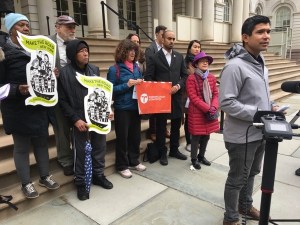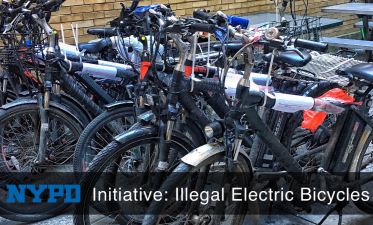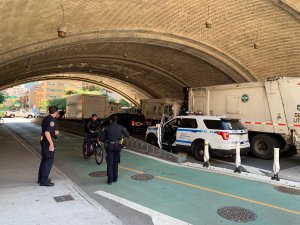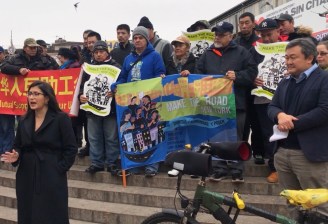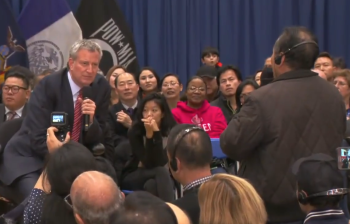Op-Ed: Stop Targeting Food-Delivery Workers. Legalize Throttle E-Bikes
Legislation aims to undo an unjust ban falling heavily on vulnerable immigrants
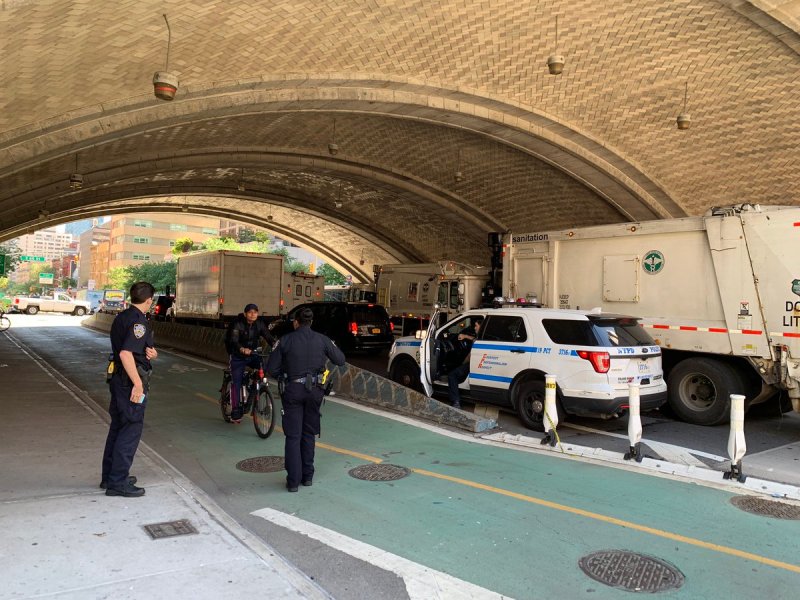
Many New Yorkers this week saw the disturbing sight of police officers accosting and ticketing low-income delivery workers who use throttle-based e-bikes to deliver food across the five boroughs. One worker even was handcuffed and arrested.
Such e-bikes are legal in 30 other states, including in nearby New Jersey, but not here in New York. Enforcing this misguided prohibition, Mayor de Blasio and the NYPD have been targeting the delivery workers, most of them immigrants, slapping them with fines of up to $1,000 and confiscating their means of livelihood, sometimes for weeks.

The racial and ethnic disparities in who is stopped are as extreme as those seen in the NYPD’s unconstitutional “stop-and-frisk” policy. Research shows that Spanish- and Chinese-speaking working cyclists are ticketed more often, suffer far more bike confiscations, and receive far higher fines than their non-immigrant counterparts. Mayor de Blasio is re-creating the darkest days of the NYPD’s enforcement history.
Fortunately, New Yorkers are uniting to end this injustice.
Senator Jessica Ramos and Assembly Member Nily Rozic recently introduced legislation that would legalize throttle-based e-bikes and e-scooters and give municipalities throughout New York the power to determine their use.
Advocates, including Transportation Alternatives, Make the Road NY, Legal Aid Society, Biking Public Project, NY League of Conservation Voters, and many others support their bill.
The Ramos-Rozic legislation (S5294/A7431), which has more than 50 co-sponsors in the Assembly, represents a critical first step toward delivering justice for the workers who rely on e-bikes to earn a living. But that alone won’t end the mayor’s heartless crackdown on the delivery workers.
To ensure a fair result:
- The New York City Council must pass its own legislation for legalization to cement the legality of e-bikes and prevent draconian enforcement — and, in so doing, rectify its own culpability for the 2004 law that enables much of today’s crackdown. Fortunately a package of legislation exists, introduced by Council Members Espinal, Cabrera and Dromm. Mayor de Blasio must support this effort and work to ensure the legislation supports workers in order to rectify the hardship the crackdown has caused.
- Fines levied for illegal use of an e-bike during the course of work, including commuting, must be required to go to the employer, never the worker. Today, restaurants routinely require their workers to have e-bikes — but then the workers themselves, not the restaurants, bear the brunt of fines and enforcement. Confiscation of e-bikes should be prohibited by state law, unless the bike was involved in a suspected crime.
- Throttle-based and pedal-assist e-bikes going up to 20 mph should be treated the same as bicycles. Throttle-based e-bikes going up to 28 mph should be legalized but treated differently from bicycles and with some restrictions, in recognition of the risk from their higher speeds. Many delivery workers are in their 50s and 60s and work 10 to 12 hour days; the throttle capacity of their e-bikes is what enables them to keep working in a job that is often the best of several bad options.
- The city should enact proposed legislation to establish a conversion fund to help workers convert their illegal e-bikes into legal, peddle-assist versions. Years of NYPD crackdowns have done little to prevent workers from using their e-bikes. The pragmatic approach is to legalize and assist with conversion. The conversion fund should be financed in part by food-delivery companies such as Seamless and GrubHub, as well as e-scooter and e-bike-share companies.
- Consider a modest surcharge on food delivery in order to fund a restitution program for the workers who have been on the receiving end of the mayor’s crackdown. The program that could expand further to help improve wages and working conditions for all restaurant workers.
Workers on e-bikes are vulnerable road users, just like people on foot, in wheelchairs and on traditional bicycles. Because of the safety-in-numbers effect and the ability of e-bikes to replace cars and car-trips, state and city policy should support e-bike use, not discourage and prohibit it.
E-bikes and e-scooters also make sense for New York for many sound environmental reasons.
They are greener than cars, replace car trips at significant rates that reduces traffic congestion and allow us to breathe cleaner air and, importantly, make our streets safer. They also can improve access to jobs and education by offering new options in transit deserts, and by fostering mobility for people of varied ages and abilities.
Let’s legalize e-bikes and rectify this latest dark period of policing in New York City.
Marco Conner is interim co-executive director of Transportation Alternatives.
